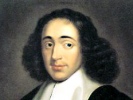
Sacred Texts Philosophy Spinoza Index Previous Next
Buy this Book at Amazon.com


Correspondence, by Benedict de Spinoza, [1883], at sacred-texts.com
[The writer asks for explanations of some passages in the letter about the infinite (XXIX.).]
Distinguished Sir,—In the first place I can with great difficulty conceive, how it can be proved, et priori, that bodies exist having motion and figure, seeing that, in extension considered absolutely in itself, nothing of the kind is met with. Secondly, I should like to learn from you, how this passage in your letter on the infinite is to be understood:—"They do not hence infer that such things elude number by the multitude of their component parts." For, as a matter of fact, all mathematicians seem to me always to demonstrate, with regard to such infinities, that the number of the parts is so great, as to elude all expression in terms of number. And in the example you give of the two circles, you do not appear to prove this statement, 2 which was yet what you had undertaken to do. For in this second passage you only show, that they do not draw this conclusion from "the excessive size of the intervening
space," or from the fact that "we do not know the maximum and the minimum of the said space;" but you do not demonstrate, as you intended, that the conclusion is not based on the multitude of parts, &e.
2 May, 1676.
406:1 Tschirnhausen.
406:2 Viz., "They do not hence infer . . . . component parts."